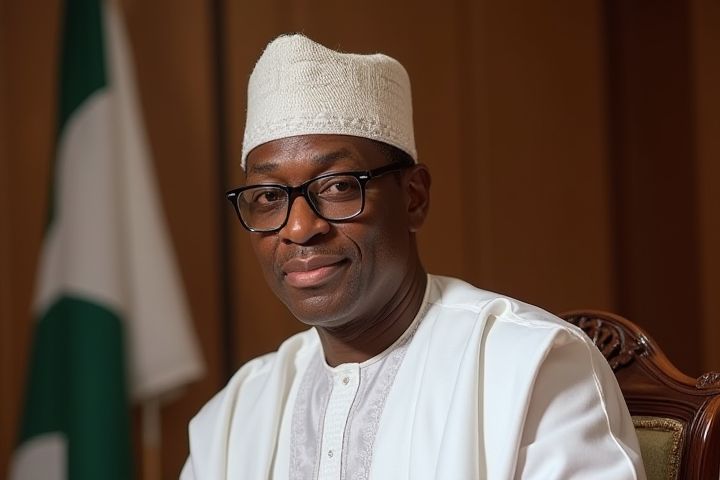
In Nigeria, one of the most recognized politicians is Muhammadu Buhari, who served as the President from 2015 to 2023. His administration focused on anti-corruption measures, economic reform, and national security, addressing issues such as Boko Haram insurgency and local infrastructure development. Another prominent figure is Bola Ahmed Tinubu, known for his role as the Governor of Lagos State and his influential position in the All Progressives Congress (APC). The political landscape in Nigeria is diverse, with many leaders representing various ethnic groups and advocating for regional interests. Understanding the impact of these politicians on governance and public policy is essential for your engagement with Nigeria's democratic processes.
Political influence
In Nigeria, Bola Ahmed Tinubu is often regarded as a highly influential political figure, serving as a former governor of Lagos State and a prominent leader within the ruling All Progressives Congress (APC). His strategic political maneuvers and ability to cultivate alliances have significantly shaped Nigeria's political landscape, especially during elections. Tinubu's influence extends beyond party lines, impacting both local and national governance through his extensive network and resources. Your understanding of Nigerian politics will benefit from examining his role in key policy decisions and electoral outcomes.
Leadership style
Nigeria's political landscape features several noteworthy leaders, but one standout is Muhammadu Buhari, whose leadership style combines a focus on anti-corruption and economic revitalization. Buhari's approach emphasizes integrity, often promoting transparency within government operations, which aims to restore public trust. His administration has prioritized security measures, particularly in combating terrorism and ensuring stability in regions affected by conflict. As you analyze effective leadership in Nigeria, consider how Buhari's dedication to democratic principles influences both governance and public engagement.
Economic policies
In Nigeria, one of the most impactful politicians known for their focus on economic policies is **Bola Ahmed Tinubu**. As the former governor of Lagos State, he implemented transformative initiatives that spurred economic growth through infrastructure development and public-private partnerships. His strategies emphasized tax reforms and revenue generation, significantly increasing the state's internally generated revenue. With a reputation for fostering a conducive environment for business, Tinubu's policies have been instrumental in attracting foreign investment and stimulating job creation across various sectors.
Social programs
In Nigeria, **Governor Babajide Sanwo-Olu** of Lagos State is recognized for his commitment to social programs aimed at enhancing the quality of life for residents. His administration has implemented initiatives in healthcare, education, and transportation, prioritizing accessibility and efficiency. The Lagos State Employment Trust Fund supports job creation and skills development, directly impacting youth and women empowerment. By focusing on inclusive policies, Sanwo-Olu's leadership encourages socio-economic growth and community participation, positioning him as a influential figure in the realm of social development in Nigeria.
Anti-corruption stance
Muhammadu Buhari, Nigeria's former president, is often recognized for his strong anti-corruption stance, championing integrity and transparency in governance. During his tenure, he implemented various initiatives aimed at curbing corrupt practices, including the establishment of the Presidential Enabling Business Environment Council to promote business integrity. His administration's recovery of stolen assets significantly contributed to public trust in government. Engaging the public through anti-corruption campaigns, you can see the emphasis on accountability as a crucial element for national development.
Electoral success
In Nigeria, a key figure known for electoral success is Bola Ahmed Tinubu, whose strategic political maneuvers have significantly shaped the country's political landscape. His tenure as Governor of Lagos State established a solid foundation for progress, promoting infrastructural development and economic growth that resonated with voters. Tinubu's ability to unify diverse political factions and galvanize grassroots support demonstrates his adeptness in navigating Nigeria's complex electoral dynamics. Your understanding of Nigeria's political climate will benefit from analyzing how leaders like Tinubu leverage both social capital and political alliances to achieve electoral victories.
International relations
One of the most notable politicians in Nigeria renowned for his expertise in international relations is Ngozi Okonjo-Iweala. As the former Minister of Finance and Foreign Affairs, she played a pivotal role in shaping Nigeria's engagement with global economic institutions and fostering international partnerships. Her leadership in the World Trade Organization highlights her commitment to promoting trade policies that benefit developing countries. Furthermore, her advocacy for sustainable development showcases Nigeria's strategic position in international forums, emphasizing the importance of collaboration in addressing global challenges.
Public perception
In Nigeria, opinions about the best politician often revolve around their public perception, shaped by charisma, transparency, and relatable policies. Figures like Governor Babajide Sanwo-Olu of Lagos State have gained recognition for their effective communication and targeted initiatives addressing urban challenges. Other politicians, such as Atiku Abubakar, are noted for their extensive experience and economic reforms, resonating with citizens seeking progress. Your trust in a politician frequently hinges on their ability to connect with the constituents and deliver tangible results that improve everyday life.
Development initiatives
One prominent Nigerian politician known for his commitment to development initiatives is Babatunde Fashola. As the former Governor of Lagos State, he emphasized infrastructure improvement, including the construction of roads, schools, and hospitals that significantly enhanced urban living conditions. Fashola also championed initiatives in renewable energy and waste management, aimed at fostering sustainability within the rapidly growing metropolis. His leadership exemplifies how targeted policies can drive economic growth and social progress in Nigeria.
Governance impact
One of the best politicians in Nigeria, renowned for his governance impact, is Babatunde Fashola, the former Governor of Lagos State. During his tenure from 2007 to 2015, Fashola implemented transformative policies that improved infrastructure, education, and healthcare, making Lagos a model for urban governance in Africa. His initiatives in traffic management and waste disposal have been pivotal in addressing the challenges of a rapidly growing metropolitan area, enhancing the quality of life for millions. Fashola's commitment to transparency and efficient resource management has set a benchmark for good governance in Nigeria, inspiring future leaders.
